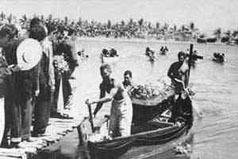El rio y la muerte
Mexiko 1954, 81 min.
Director: Luis Buñuel
Producers: Armando Crive Alba (Clasa Films Mundiales)
Screenwriters: Luis Buñuel, Luis Alcoriza - based on a novel by Miguel Alvarez Acosta
Director of Photography: Raúl Martínez Solares
Music: Luis Hernández Brétón
Cast: Lilia Prado, Carlos Navarro, Augustín Insunza, Miguel Manzano,
Javier de la Parra, Guillermo Bravo Sosa, Felipe Montojo.
Ceny: Silver Ariel 1956 (Mexico)
|

|
The opening scene of Buñuel´s drama set in Mexican countryside already reveals a
certain exaggeration of the story and characters. During a traditional wedding party
two men start quarreling and suddenly one of them falls dead, with a knife in his chest.
The easiness and eagerness with which people resort to violence as a means of settling
arguments have an unintentional comic effect on the spectator, making him hungry for
more killing. Every conversation between two men hides an exciting chance, often a
fulfilled one, of another character´s death. The myth of man´s honour that has to be
defended against any verbal or physical attacks is, perhaps deliberately, pushed to the
limits of absurdity. Buñuel depicts the extremely violent rural society with irrational
intensity which makes us shake our heads in wonder. But it is precisely the hyperbolical
representation of violence that puts it in a deep contrast to the story of the
protagonist, who steps out of the vicious circle. Soon enough for him, the young hero
left the village and now works in the city as a physician. The city, acting as a
perfect symbol of progress, future and freedom, is clearly opposed to the village,
still obeying the bloody mores. In the city, rural "machism" - the cult of virility and
worthlessness of the enemy´s life - is replaced by an almost socialist vision of a
smoothly living society. Obviously, such a society needs doctors and the hero is one.
Nevertheless, he has to return to the village once more for the last time, because an
enemy´s death passes on the following generations through the moral imperative of the
so-called "vendetta". The enlightened hero dissuades his rival (their fathers killed
each other) from the duel and in the final scene the two men embrace each other
cheerfully. The curse is broken - the countryside will be "colonized", values like
"respect for the other", "understanding" and "sympathy" will regain their meaning...
In The River And Death Luis Buñuel descended to unusual didacticism and
black-and white view. Instead of a thrilling drama about the ancient laws of Mexican
countryside (and Mexican mentality as a whole) he made an agitprop with elements of
soap opera poetics. During the shooting he constantly had to bow to the producers as
well as to Miguel Alvarez Acosta, the author of the original novel. The film is bad
due to the lack of creative freedom (cf quotations).
"What I don´t like about the film is that it develops the thesis of the novel it is
based on, the meaning of which could be expressed by the following idea: Let´s educate
ourselves, let´s cultivate ourselves, let´s all study at university and stop killing
each other. I don´t believe in that!" Luis Buñuel
"It´s a pity that everybody cannot study. There would be less crime." the protagonist
"I don´t want to reduce my representation of Mexico to a few tiroreos (gunfights)." L.B.
Plus:
"Machism" arises from a very strong and greatly self-conceited feeling of man´s dignity.
Nothing could be more dangerous than a tremendously prickly Mexican who looks at you
and tells you, for instance after you have refused to drink the tenth glass of tequila
with him, the dreaded sentence: Me está usted ofendiendo ("You are offending me"). In
that case, it is better to drink the tenth glass. (Luis Buñuel, My Last Breath)
[ translation: Sabina Poláková ]
Links:
IMDb - record in the internet film database
|
|